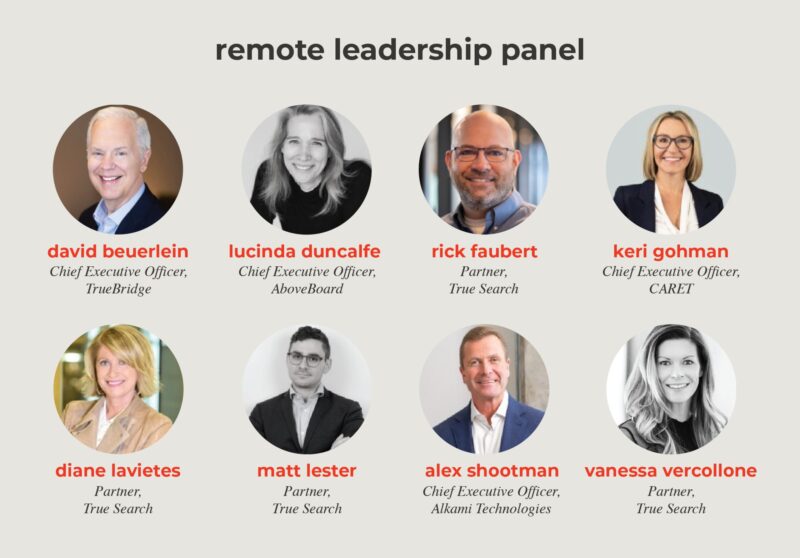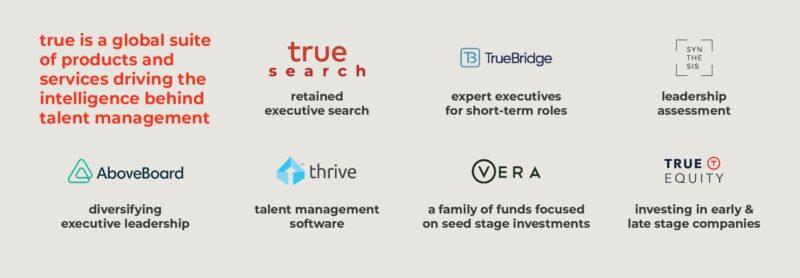
When Keri Gohman took the reins as CEO of CARET she met with 100 people across her business to ask if they’d like to come back to the office. All 100 said, ‘no thanks.’
“Zero people wanted to come back,” Gohman said. “Everyone said, ‘We love this. This has changed my life. It’s saved me money.’”
These past three years gave many more workers a taste of the control and flexibility of remote workplaces. While the scale hasn’t settled yet on what percentage of companies will require a return to work—it’s safe to say—distributed workforces are here to stay. That means all executives need to be equipped to lead from afar.

We interviewed C–suite and board members from True’s network, along with True leaders, to discover the key components of successful leadership for a distributed workforce.


Practice Intentional Communication
Some managers yearn for the days when employees were in the office, absorbing culture and strategic purpose through casual conversations by the watercooler (or coffee maker). But, did that ever really happen?
“You’re leaving the operating of your company to chance encounters by the watercooler?” Gohman asked incredulously. “The reality is that’s never been a good way to run the company. We run on fundamentals and being remote has forced us to be better on fundamentals.” For Gohman that means remote executives must be better at managing to outcomes and better at communication.
(Listen to Keri Gohman on the True Builders podcast – Spotify / Apple / Google)

AboveBoard CEO Lucinda Duncalfe agrees. Her tech startup’s employee base is 100% remote, and 58% of the active executive–level and board–level opportunities on the AboveBoard platform are hybrid or remote.
“When casual interactions are much less common, leaders have to consciously build communication channels that ensure everyone has access to what they need—up, down, and across the organization,” she said.
Remote leaders must build technology–enabled channels for interaction and communicate even more clearly than in–person leaders.
“One must rely more on structure and less on charisma,” Duncalfe said. “And anything meaningful has to be written down.”
The irony is that when people are physically further apart—great leaders must be more present for their teams than ever before.

Connect Work to Strategic Priorities
True board member Alex Shootman has been a remote president for Apptio and Eloqua, and led remote–first workforces as CEO of Workfront and now as CEO of Alkami Technologies. “You’ve got to be really good at forming your expectations about the work that your team is doing—and connecting that work to the strategic goals of the company,” Shootman said.
(Listen to Alex Shootman on the True Builders podcast – Spotify / Apple / Google)
He notes that remote frontline management has to step up their OKR process and work harder to convey purpose to their remote teams.
“People do great work when they’re really passionate about their work. They’re really passionate about their work when three things exist. Number one, do they understand their role? Number two, do they believe that their role matters? And number three, do they think they’re going to have an opportunity to be proud of their work?”
Build Relationships
They say absence makes the heart grow fonder, but the data shows that one danger of distributed workforces is that employee engagement can drop. True’s top recruiters see time and time again that the best remote leaders know how to keep relationships strong even from afar.
“The best remote leaders I know do a great job of staying regularly connected to their teams and being very responsive and seemingly always available,” said True’s People, Talent, Legal practice partner Rick Faubert. “As budgets allow, they find ways to schedule efficient and effective offsites, but more importantly they stay visible and supportive as possible on a day–to–day basis.”

True’s Consumer Practice Partner Diane Lavietes agreed that being a “quick responder” is a strength for a remote boss. Also important is building personal connections and engagement, she said. “The best remote leaders don’t forget to know their team beyond the work that gets done.”
Partner Vanessa Vercollone recruits elite finance leaders as head of True’s Finance practice, and she also manages a large team of True’s remote recruiters. About 50 percent of the roles she hires for are remote—although she’s noticed a shift towards clients preferring hybrid (3x a week in–office) hires.
“It’s critical for remote leaders to build relationships one–on–one and outside of the day–to–day job,” she said. “It’s especially important for remote leaders to be intentional about discussing career paths and providing employees performance feedback.”
Be Thoughtful About Meetings
When teams do get together—whether in a virtual meeting or an in–person meet up—the best leaders use that precious time wisely.
Vercollone continued, “Successful remote leaders know when to spend time with their teams and know how to make all interactions productive. They make sure meetings are purposeful and keep time and frequency in check.”
They also have a disciplined approach to scheduling and maintaining frequent touchpoints with colleagues and clients.
That skill of knowing how to involve the full group also stood out to Faubert. He sees successful remote bosses “finding creative ways to ensure participation and robust ‘group think’—as opposed to just having the call leader talk endlessly.”

Demonstrate Proven Success Working Remotely

True partner Matt Lester recruits for go–to–market roles in B2B SaaS, fintech and financial services. Eighty five percent of the roles he’s hiring for are remote or highly–flexible. “It’s a complete 180 degrees from five years ago,” he said.
When assessing executives for remote roles, he’s looking for proven success and interviewing for those key leadership attributes of communication and relationship building.
Lester also assesses potential leaders for how they onboard their teams, which he says is critical in an environment where instead of getting the office tour (here’s the watercooler…) you’re “just waking up, throwing on your hoodie and getting in front of a screen.”
“Are you an aggressive culture builder, and a beacon of talent that builds relationships before day one?” Lester asked. “How regularly are you checking in with your teams? Do you track your team’s performance and activity?”
He actively screens for transparency in a candidate. “We want someone whose natural disposition is to just have full transparency and aggressively share,” because that clarity breeds broader connectivity across distributed workers.
And while the remote executive must show they’re a master of communicating and creating connection, they must also demonstrate full independence for themselves. This is especially true for the interim and fractional leaders CEO David Beuerlein recruits to join the TrueBridge Talent Network, where over 80 percent of the available opportunities are remote or hybrid.

“We always seek to identify leaders who are highly skilled, but the bar is even higher for a remote worker,” Beuerlein said. “They can’t be counting on support from others on the executive team—not that they aren’t willing to provide it, but they just may not be available.”
His highly–vetted network of executives are asked to provide examples of where they’ve led independent projects or workstreams. “Even if the work was done on–site, these types of projects can provide a solid indication of a candidate’s potential for success as a remote leader,” Beuerlein said.
It’s important to understand how the executive was able to succeed at a prior company to gauge if those experiences will ensure a successful stint at a new one. Part of that learning is the reference check process. A great indicator for future success is when team members have followed leaders from company to company. Another safe bet is someone who has shown that frequent travel or long–distance commuting did not lead to burnout.
And finally, the remote interview itself is a reliable barometer for success. It pays to pay attention to details during the interview process, emphasized Faubert. “How candidates show up and stay engaged with us during our very virtual projects can be an indicator of how they will operate on a client’s team as a remote executive. When a candidate takes the extra effort to set themselves up for an undistracted and professional video call with us, it gives us confidence that they will do the same on the job.”
Overall, to interview for a great remote leader one must drill deeply into what they did and how, and follow through to the results. If they haven’t done it before, do they have the foundational attributes of intentionality and independence? And, perhaps, most importantly, are they effective communicators?
—
Want to get in touch? hello@trueplatform.com
Contact True leaders in this article: David Beuerlein, Lucinda Duncalfe, Rick Faubert, Diane Lavietes, Matt Lester, Vanessa Vercollone
For True‘s latest thought leadership and data analysis: Subscribe to True Insight.
